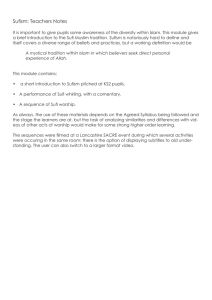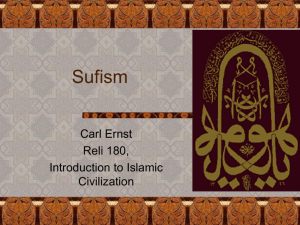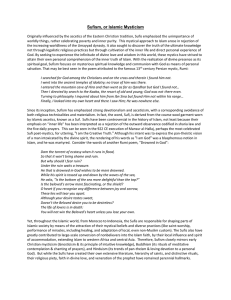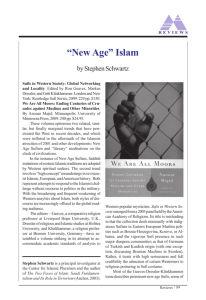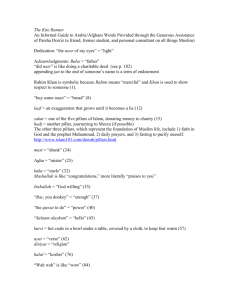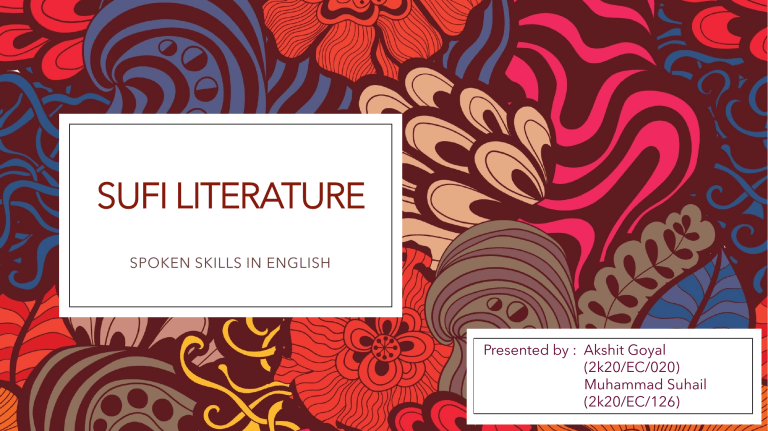
SUFI LITERATURE SPOKEN SKILLS IN ENGLISH Presented by : Akshit Goyal (2k20/EC/020) Muhammad Suhail (2k20/EC/126) CONTENT ▪ WHAT IS SUFISM ▪ PHILOSOPHIES AND BELIEFS ▪ ORIGIN OF SUFISM ▪ MODERN DAY SUFISM: NEOSUFISM ▪ SIGNIFICANCE OF SUFISM ▪ SUFISM’S IMPACT ON LITERATURE, ART & CULTURE ▪ SOME FAMOUS SUFI POETS “Not Christian or Jew or Muslim, not Hindu, Buddhist, Sufi or zen. Not any religion or cultural system. I am not of the East, nor of the West.... My place is placeless, a trace of the traceless.” ▪ REFERENCES WHAT IS SUFISM? ▪ The term Sufism likely derives from the practice of wearing wool (suf in Arabic), an act associated with mystics. It may also come from the Arabic word for purity (safa). ▪ It deals with worship in a unique form, typically through music, the decorative arts, unorthodox ways of living and love. ▪ Love is a dominant feature in Sufi literature and is considered one of the most beautiful symbolisms for the love between man and God. ▪ The Sufi literature is considered a vibrant part of Islamic literature and civilization, and hence the God found in Sufi works is considered the God as found in Islam. ▪ Yet the increasing interest of the non-Islamic world in Sufi works can show that this Islamic literature goes beyond perusing the relations between man and God and encompass the whole humanity, crossing the borders of religion to become truly universal. PHILOSOPHIES AND BELIEFS ▪ Sufis’ primary desire is a personal connection with God while they are still alive. ▪ This contradicts traditional Muslim beliefs, which assert that this connection will occur after their resurrection. ▪ This experience is supposedly so amazing that it can only be expressed through metaphors. ▪ In Sufi literature, the joy of divine union often accompanies the misery of being separated from God. ▪ This connection, called “fana” (“destruction”), occurs in the final stages of spiritual development. One loses their individual identity and becomes aware only of God’s presence within them. “Jalāl ad-Dīn Mohammad Rūmī” ORIGIN OF SUFISM ▪ There is disagreement among religious scholars and Sufis themselves about the origins of Sufism. ▪ The traditional view is that Sufism is the mystical school of Islam and had its beginnings in the first centuries following the life of the Prophet Mohammad. ▪ Sufi Inayat Khan recognized the multi-religious roots of Sufism as well as its contemporary relevance for people of all faiths. "Every age of the world has seen awakened souls, and as it is impossible to limit wisdom to any one period or place, so it is impossible to date the origin of Sufism." MODERN DAY SUFISM: NEOSUFISM ▪ Coined by Fazlur Rahman (a Pakistani scholar and Islamic philosopher), the term neosufism refers to the reformist currents among 18th-century Sufi orders. ▪ More recently, however, the term’s meaning has evolved. ▪ Examples of this include Sufism Reoriented, an offshoot of traditional Sufism, and The Golden Sufi Center. The latter, located in the US, England, and Switzerland, combines the traditions of Hinduism and neo-Sufism. ▪ Currently, active Sufi academics, publishers, and writers include Timothy Winter, Hamza Yusuf, Llewellyn Vaughan-Lee, Nuh Ha Mim Keller, and Zaid Shakir, among others. “Hagia Sophia is a symbol of harmony, the meeting point of the world's religions.” SIGNIFICANCE OF SUFISM ▪ Despite its conflicts with traditional Islam, Sufism remains an important part of Islamic and Eastern history. ▪ Though it is widely known as Islam’s mystical brother, it is important to recognize it within the Islamic context and not distort its message, as some scholars have done, as a pantheistic or even anti-Islamic one. ▪ Without Islam, Sufism might never have been born. And without Sufism, the beautiful artworks and traditions curated by practitioners over centuries of worship may never have existed. SUFISM’S IMPACT ON LITERATURE, ART & CULTURE ▪ Some of the most famous and talented figures in Islamic history have been Sufis. This includes Rumi, a 13th-century Persian poet, often considered to be one of the greatest poets of all time. ▪ The visual arts have also explored the famous tenets of Sufism. ▪ The Battle of Karbala, the subject of the painting, was a result of a violent disagreement between the Sunni and Shia branches of Islam. ▪ This, of course, is part of a larger history of beautiful Islamic visual art, calligraphy, and design. “The Battle of Karbala” SOME FAMOUS SUFI POETS Rumi was born on September 30, 1207, in Afghanistan’s Balkh. He took birth in a Persian family and gained popularity in the 13th century. The books comprising Rumi’s compositions remain to be bestsellers even today. Manasvi is one of the most popular books of Rumi. Bulleh Shah was a 17th-century Punjabi philosopher and Sufi poet. The prophetic poet is regarded as “The father of Punjabi enlightenment”. Dama Dam Mast Qalandar and Mera Piya Ghar Aya are some of the most popular compositions of Bulleh Shah. SOME FAMOUS SUFI POETS Sultan Bahu was one of the most popular Sufi poets of the Qadiri order. Sultan Bahu was born in Shorkot, Pakistan. He was most active during the Mughal period. Some of the most famous works of Sultan Bahu include Abyat e Bahu, Nur ul Huda, Jami ul Israr and Deewan e Bahu. The mystic poet was born in India’s Varanasi in 1398 and passed away in 1518 in Maghar. Kabir Das united people across religions. He is equally respected in Islam and singers like Abida Parveen continue to be his ardent follower. SOME FAMOUS SUFI POETS Popularly known as Khwaja Ghulam Fareed, the great Sufi poet was a poet from Punjab. Some of the most famous compositions of Ghulam Fareed include Deewan-e-Farid, Manaqabe Mehboobia and Fawaid Faridia. Lal Shahbaz Qalandar whose real name was Syed Usman Marwandi holds a special position among the followers of Islam. Shahbaz Qalandar was born in 1177 in Maiwand. He passed away in Delhi Sultanate’s Sehwan on February 19, 1274. REFERENCES ▪ https://www.britannica.com/topic/Sufism ▪ https://institute.global/policy/what-sufism ▪ https://indianculture.gov.in/rarebooks/overview-sufiliterature-sultanate-period-1206-1526-ad ▪ https://voices.shortpedia.com/prajjval-tripathi/famous-sufi- poets/ ▪ https://www.poetryinternational.org/pi/cou_article/23608/Thr ee-classic-sufi-poets-from-Pakistan/nl/tile
